#reminds me of early childhood in the late 90s/early 2000s with all the places that hadn't been updated since the 80s my beloved
Explore tagged Tumblr posts
Text
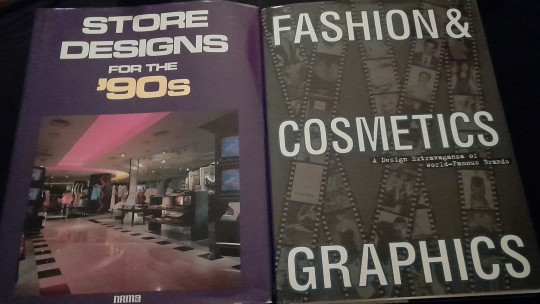
these 2 books are singlehandedly saving my day right now
#photos of late 80s/early 90s malls and department stores!!! popular brands from 1995!!!#ye olde moodboards perhaps? either way i love them so much 🥺🙏💕#the smaller department stores and supermarkets/food courts feel very nostalgic to me#reminds me of early childhood in the late 90s/early 2000s with all the places that hadn't been updated since the 80s my beloved#anyway i love free roadside finds <3
7 notes
·
View notes
Text
Special Interest Timeline: Retro Games
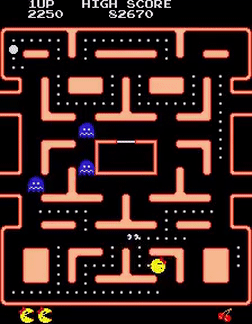
I'm on a retro games special interest kick, and in my previous post on said things, I talked about how - in the mid-aughts - I really got into games made in the 1970s and 1980s... In the early 2000s.
And I got my history a little messed up when writing about it, so I shall do... a timeline!
Mostly for my sake!
I'm one of those autistics who tries to keep a whole-ass timeline about my special interests... When I got into it, what got me into it, how long it took me to take the next step and discover more things about it, etc....
My love of retro games stemmed from a childhood of playing simplistic MS-DOS shareware games in the late '90s. Games off of floppy disks, like HUGO'S HOUSE OF HORRORS, COMMANDER KEEN 2, CRYSTAL CAVES, WORD RESCUE, CD-MAN (a PAC-MAN clone), SKI FREE, and more... I also forgot to mention that I had a hand-me-down NES in the '90s as well...
Again, going off of my previous post, I mentioned that it kinda starts in the early 2000s. I want to say approximately 2002/2003?
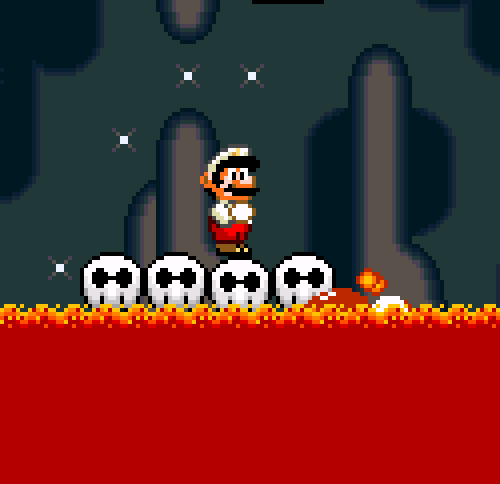
Christmas 2002: I get a GameBoy Advance and SUPER MARIO ADVANCE 2. SMA2 contains a really good port of SUPER MARIO WORLD, originally released in 1990, and an updated version of the 1983 arcade title MARIO BROS. I don't know if this necessarily kicks off the special interest, but it definitely plays a big part in it.
Late 2002/Early 2003: This is approximate. A guess. Around this time, I went to my local swimming pool every mid-week, or something like that, with my father. Afterwards, we'd stop for a bite at a nearby diner. They have a MS. PAC-MAN machine in the vestibule. One day, I watched someone doing really really good at the game. I'm reminded of the old DOS games I loved so much. Around this time, I was obsessed with what year a piece of media came out, so upon seeing the "copyright 1980, 1981" on the attract mode of the game, I had learned something new: Arcade games like that dated back to the 1980s.
Throughout 2003: Going to arcades wherever I went (i.e. bowling alleys, restaurants, etc.) and seeing at least one retro arcade game there. A lot of the time, it was one of those MS. PAC-MAN/GALAGA "Class of 1981" cabinets that were pretty new at the time.
Christmas 2003: I'm given two plug-n-play retro games collections... This is where it all *really* takes off...


The one on the left is the Jakks Pacific Namco set, which contains PAC-MAN, BOSCONIAN, RALLY-X, DIG DUG, and GALAXIAN. Pretty solid ports, all things considered. This I got on Christmas Eve, and I remember that night trying out all the games... And I played the living daylights out of this thing after that...
The one on the right was a bootleg, a Frankenstein's monster-like controller system concoction that were sold in malls and on QVC and the like. My grandmother got that one for me, and it contained a cartridge containing 84 various Famicom and NES games. These "Famiclones" were common back then and it was a side-market that only mutated over time. Luckily, this was one of the less egregious ones, and it had an assortment of NES games I couldn't get elsewhere. The hand-me-down NES we had no longer worked, so this was a worth substitute... Take out the cartridge, there's 10 built-in games that are basically Famiclones. Weird thrown-together 8-bit games of origin I'm unaware of at the moment.
Early 2004: Near my dad's place is a warehouse selling arcade machines and cocktail tables. While they didn't allow customers to play the games, they did - somehow - make an exception for me. I visited a few times and loved it, it was like paradise to my 11-year-old self. I'm sure the guy running the place wanted us OUT, haha.
Next... This is going to sound super-nerdy, but upon doing very well in a spelling bee around February/March and winning... A $200 gift card to... Circuit City! Yes, upon a winning that gift card, what do I buy? Retro game collections!
I believe I got NAMCO MUSEUM and MIDWAY ARCADE TREASURES on one of the shopping trips, in addition to the GameBoy version of NAMCO MUSEUM, PAC-MAN COLLECTION, and KONAMI COLLECTOR'S SERIES: ARCADE ADVANCE.
I visit the website System 16 and KLOV (Killer List Of Video Games) quite frequently, too.
Also around this time, I get my hands on an Atari collection for the PC called ATARI ANNIVERSARY EDITION. I also receive a book called THE ULTIMATE HISTORY OF VIDEO GAMES by Steven L. Kent.
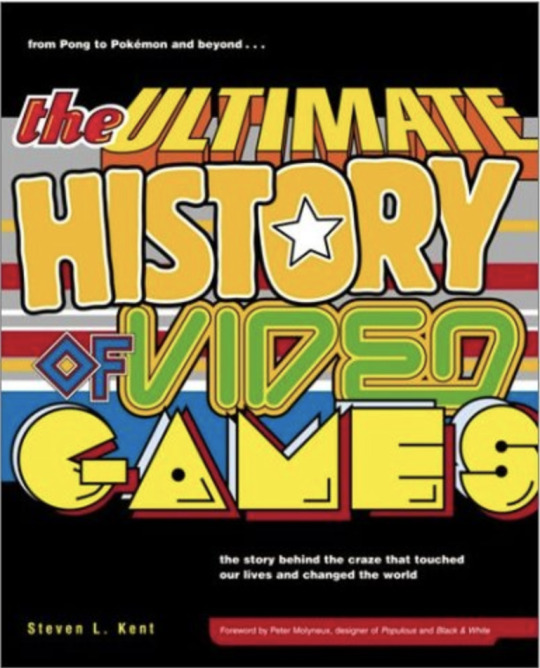
SUPER MARIO ADVANCE 2 is in regular rotation around this time.
Fall-Christmas 2004: For my birthday and Christmas, I get...
ATARI ANTHOLOGY for the XBOX, and another Jakks Pacific Namco collection, this time including MS. PAC-MAN, MAPPY, GALAGA, XEVIOUS, and POLE POSITION. I also get this fantastic coffee table book by Rusel DeMaria and Johnny L. Wilson:

I'll cap it off here, but this is where it peaks, and I'm all about these kinds of things from here on out.
#retro games#retro video games#light nostalgia#reminiscing#autistic#special interest#autism#neurodivergent#making my special interest INTO a special interest
3 notes
·
View notes
Text

backrooms are so cozy to me
that lack of daylight and lack of context reminds me of the late 90's and early 2000s. it reminds me of childhood all the shows for children were shot in these lsd trip themed fucking studios and everything was weird and there were no windows and no normal passage of time. lovely. i love places that have you like im not sure if theres a world outside this room.
2 notes
·
View notes
Note
what's your favorite thing about wong kar wai's movies? why do you like his movies so much?
wrote this in the notes app at 3am. this got very long. wkw’s one of my fave directors of all time
first of all, i did not like wong kar wai’s movies growing up. my first introduction to wong kar wai was with in the mood for love, and i always hated how slow the movie was—i could not understand the value of two middle aged people walking circles around each other on when i was eight years old. my mother was particularly fascinated with the movie and every few years or so she’d borrow it from the local library just to rewatch it by herself, or with me as an unwilling audience. maybe she just really liked tony leung like everyone else did, or i didn’t understand what she was going through back then. now, she watches it a lot less, but ironically i’m the one who watches it on a regular basis. when i look back, i realize my hatred of in the mood for love stemmed from my rejection of my mother when i was younger, along with anything related to my culture/heritage. it was my way of reconciling the isolation i felt in my new home at a young age—i thought that rejecting any part of my past would allow me to assimilate better (and for the most part it worked until senior year of high school give or take). i can say now that my former hatred/rejection of wong kar wai’s greatest work—his magnum opus—makes me appreciate him a lot more. like my mother taught me, it is best not to hate if you can love one day.
my real love and fascination for wong kar wai started when i was 18. the week after my first week of college finals, i watched his entire filmography (excluding anything post 2046) in one long sitting. i was exhausted from an accumulation of things: college did not go the way i expected and i hated science with a passionate sincerity by the end of the year. that year, i had also not chosen to go home. regretted not just going back to vietnam a lot and i spent the entire first year of college just missing it. i was mentally emotionally exhausted and homesick so i found immediate comfort and familiarity in wong kar wai’s films. all of wong kar wai’s films are based around the simple theme of connection, each character desires connection with another —whether through strangers like in chungking express or estranged lovers in a foreign city like in happy together. every character is lost in their own world of loneliness, but they’re not consumed by it as they constantly venture out to find a cure for their loneliness. there’s a sort of warm tenderness to their eternal loneliness. wong kar wai’s characters are all very simple, but that just makes them the more normal. he adds an amusing, yet charming aspect to a lot of his characters, which makes them all the more real. at the end of the day, they’re the most ordinary of people, but framed in wong kar wai’s romantic vision of the world. for me, i can see myself in a lot of his characters, especially as i’ve now settled myself into my twenties.
most of all, wong kar wai’s movies remind me of home a lot. more than anything. vietnamese cinema barely exists, and his films of hong kong are one of the only threads of my childhood memories captured in film. in his films, his characters loneliness stems from an urban isolation and a desire to find home. how can one constantly be surrounded by people, yet feel so lonely? 90s hong kong reminds me a lot of early 2000s saigon, right before true modern urbanization began to take foot. the saigon i return to now is not the place i grew up in, everything i once knew with familiarity has become foreign (you could argue the same for hong kong too). like both the main characters in happy together, i’m very much far away from home now, but what makes it worse is i don’t have a home to return to anymore despite it still being there. the isolation i feel here is much less comforting than the familiar isolation of asia, it’s an entirely distinct feeling i’ve come to differentiate. the night version of hong kong in fallen angels reminds me very much of saigon at night when i was little—when i would cling to my aunts back on the motorcycle. even more, hong kong at night is an unmistakable feeling—a true moment of limbo that you can experience nowhere else as the city seems to slow to a stop before starting up again (the dim sum scene in fallen angels reminds me of my uncle taking me with him to smalls shops buried deep in hong kong’s markets. in my opinion, the most crowded, dirty, loud places have the best food).
one of the things i also love the most about wong kar wais films are they are essentially “of an era.” context heavily influences his films, and watchers should understand that his best films are primarily made in the decade of hong kong’s handover from the uk to china. looking back now, his films are representative of the end of hong kong pop culture culture. they’re the last threads of a former culture powerhouse in asia—hk cantopop, film, and tv throughout the late 70s to 90s had an immense influence on asian pop culture today. everybody knew and loved hong kong, because it was the only true source of quality pop culture in an age of barely any in asia. hong kong was the beginning of everything essentially. kpop even, i would argue, would not be what it is today without cantopop—many idols are modeled after the cantopop idols of the 80s along with western influence. it’s sad to see that hong kong’s impact has been increasingly erased over the past 20 or so years—hong kong is now a shell of it’s former self as it can never return to its former glory. wong kar wai’s greatest films are chungking express, fallen angels, happy together, and in the mood for love. they’re all made in the years predating or after the handover, and you can see the differences in feeling of each film as it nears 1997. happy together, aside from being a somewhat tragic love story, is also the tragedy of hong kong. the handover of 1997 seems to haunt that film as the characters are also far way from hong kong; they’re on the other side of the world. there’s a sense of fear and desperation that runs parallel to the main love story and i feel like people don’t see that the first time without an understanding of historical context. chungking express and fallen angels are two sides of hong kong—hong kong by day and by night—they’re wong kar wai’s love letter to hong kong itself before it disappears in the subsequent years (which it has sadly). both of those movies are time capsules of an era, they capture an atmosphere that is now gone in hong kong. 2046 is an extension of those four movies above—an imagining of how hong kong would be be 99 years after the “end” of hong kong as it is in 1997. and finally, wong kar wai’s greatest work is in the mood for love. it’s his magnum opus, and the true end of an era: for wong kar wai’s creative capacity, for hong kong pop culture, for the actors themselves. wong kar wai has been unable to follow in the mood for love successfully with other directorial features, it’s a masterpiece in itself in its inability for recreation. the movie speaks for itself, even maggie subsequently quit acting shortly afterwards because she felt she could never top that role—it was the end of her acting career in terms of era. everything that wong kar wai put out in the 90s is of an era, it cannot and never be repeated or recreated just as the old hong kong is gone (which is why his attempt to make sequels for those movies with blossoms and the chungking express sequel will be futile. wong kar wai does not realize that that era has indeed passed (and his his break up with christopher doyle has proved to be fatal for both of them).
finally, a small addition about wong kar wai as a director himself. he’s a cancer, very true to his nature, which explains how he can so fluidly translate and portray emotion in his films. they’re almost overflowing with tender emotion, but very much so in an implicit manner. i could never do that in anything i create, it’d end up being very much lynchian in manner, which makes me appreciate his films a lot more. moreover, wong kar wai has a certain way, an intimacy with all his actors. he brings out the best in them for only his movies, and that’s what makes him so special. also, i relate a lot to wong kar wai’s method of working ..the man is one of the worst procrastinators he’s worse than me. he almost never plans or writes scripts for his movies. most of his films especially in the 90s are very much “go with the flow” improvisation (u can see that the characters are very much the actors even it’s hard to distinguish). he was editing in the mood for love up to the last minute before final submission for cannes, that’s just how much of a procrastinator he was and why it’ll take him a million years to release the chungking express sequel. it’s amazing to think how all of these great movies from wong kar wai are technically equivalent to 2000 word essays submitted a minute past the deadline. what i imagine is how different would his work be if he’d planned ahead (how much better would my essays be if i didn’t write them at 3am?). but i guess we can all see how much he’s changed in the release of his criterion collection—-he’s not the person he once was and he can’t recreate the past.
if u read this far i love you thank u for reading my inarticulate nonsense thoughts. i hope u like wong kar wai a lot more than before
60 notes
·
View notes
Note
How /did/ things change after 2001? I was born in that year and everyone says it was different before, but I've never really gotten a sense of how.
It is difficult for me to emphasize just how different the world you see on the evening news is now, from what it was like before 2001, at least as I remember it. There’s a scene in Farscape, where after years of trying to get home, the astronaut protagonist John Crichton finally makes it back to Earth with his alien friends in tow, and when he’s reunited with his father, he’s shocked to discover his dad has gone from this optimistic, forward-looking, hopeful dreamer to a nervous, jingoistic conservative. His attitude is basically, “yes, there’s dangerous aliens out there who may or may not be trying to kill us--but the galaxy is a place full of wonders you’ve never dreamed of.” His father, in the meantime, has retreated from his hopes for a science-fiction future, and views his new alien friends with suspicion.
It’s not a subtle metaphor, but it’s true. The 90s--at least in the US, at least as I remember them--were a relentlessly optimistic period. Even if things were not yet at their ideal state, there was very much a sense they were heading there; politics was mostly down to what exact flavor of the neoliberal consensus you preferred, Clinton or Bush, and the international triumph of liberal democracy was either a fait accompli (cf. the erstwhile USSR), or just around the corner (cf. hopes for China’s liberalization in the wake of market reforms). Yes, in retrospect, this was kind of a dumb world view. If you actually lived in Russia in the 90s--to say nothing of the Balkans--it was a rough decade, and a lot of the relentless optimism of the period in the United States was down to the privileged position we viewed the world from.
The blunting of that optimism--the reminder that we were still embedded in history, and the final triumph of everything good and just was not foreordained--would not in itself have been a catastrophe. Terrorism was not a strange concept in the 90s, and even Al-Qaeda-style terrorism had its predecessors in attacks on American ships and embassies. 9/11 itself was confusing and chaotic and sad, but 9/11 wasn’t the catastrophe. The catastrophe came after, in how we responded.
I think something broke in America between 1945 and 1991. Something shifted, in a nasty way we didn't realize while we were occupied with communism and stagflation and the civil rights movement. I don't mean to say that America before 1945 was the Good Guys. But the American state and the American political class viewed the world with... humility? Like, sure, the can-do Yankee spirit before 1945 had its own special kind of arrogance (and greed, and hideous bigotry), but it still thought of the world in terms of obligations we owed other countries. By the time the Cold War ended, and the US was the sole remaining superpower, that wasn't how we viewed the world. It was still sort of how we told each other, and our children, what the world was like. We certainly talked a big game about democracy and human rights. But as soon as that principled stance was tested, we folded like a cheap suit. What we should have done after 9/11 was what we had done after every terrorist incident in or against the United States before then: treated it like the major crime it was, sent a civilian agency like the FBI in to investigate, and pursue the perpetrators diplomatically. What we did instead was treat it like the opening salvo of a war--in fact, invented a war to embed it within, to give ourselves narrative justification for that stance--and crank every element of paranoid jingoism instantly up to 11. It has never abated since.
Some of this is the little things. The TSA and the Department of Homeland Security--a name I thought was creepy Orwellian shit right from the get-go. The terror alert levels. (God! remember those?) The fact that airport security--despite being just as ineffective today as it was on September 12--is still routinely humiliating and invasive and just a total waste of everybody’s time. Some of it is the big things. The way security, and the need for security, trumps all other demands including the state’s obligation to protect civil rights. And the fact that this just isn’t even up for debate anymore. 9/11, as Chomsky presciently observed, was a boon for authoritarians everywhere. Suddenly, “counterterrorism” was the magic word that let you get away with anything, like “anti-communism” twenty years prior. At the most extreme end, this led to things like anti-atheism laws being promulgated in Saudi Arabia in the name of “counterterrorism,” but you don’t have to go that absurd to find ways in which the security state has fostered authoritarianism. In every aspect of our lives, this new, fearful outlook on the world justified a gradual ratcheting down of freedom, the gradual empowerment of petty tyrants everywhere, and the weak protests, fading into silence, of people who still believed in liberty as an important organizing principle for modern society. It wasn’t even that you’d get called a terrorist-sympathizer or anything that blatant. It just ceased to be regarded as important. It wasn’t that you were wrong, or misguided, or evil. You were just a non-serious person, someone whose opinion was clearly irrelevant, whose head was permanently in the clouds, if you thought that stuff still mattered. And that never went away.
And I think a big part of what changed between 1945 and 1991 was that the US started to believe its own jingoism. When did this start? Vietnam? Earlier? Korea? I don’t know. It’s hard to pinpoint, given that my understanding of the cultural zeitgeist of the decades before I was born mostly came from my dad’s old Doonesbury collections. I don’t know how to describe what we became--what we, hideously, revealed ourselves to be--except as a kind of machismo. A kind of ruthless, General Ripper-esque us-versus-them psychosis that gripped us where the Soviets were concerned, and never let up. And we still believe it. It still infects every atom of our political discourse. We don’t question the necessity of drone strikes, only who to drone strike and how much. We don’t really question the massive powers we’ve afforded the executive branch to wage war and conduct espionage--including kidnappings and torture--and we’ve kind of forgotten that we still have a prison camp in Cuba full of people who have never been convincted of any crime. In a way, we lost faith in law entirely: by God, we couldn’t try terrorists in American courts! (Why not? What’s wrong with American courts? Don’t we have faith in our own laws, at least?) No, justice wasn’t a matter for the law to decide anymore. Justice was a matter for the military only: justice came in the form of strength of arms. Ergo, shooting Bin Laden in the head and calling that justice; ergo, Jack Bauer; ergo, blowing up Yemeni weddings. Keep America Safe. I can’t begin to tell you how alienating and horrifying so much of the last 20 years has been, if the most consequential news stories of your childhood were the OJ Simpson murders and a discussion of the President’s cum stain.
In my opinion, the seminal text of the post-9/11 world was released in the year 2000. In the original Deus Ex video game, the year is 2150, and the world is a dark, depressing place. You, the game’s hero, work (initally) for a UN counterterrorism agency while a plague ravages the world. You hunt terrorists whose existence has provided the justification for an authoritarian crackdown on dissidents everywhere. You visit a Hong Kong firmly under the control of the CCP, you fight genetically engineered mutants created by huge businesses run amok, FEMA (no DHS then) controls the federal government, and, it turns out later in the game, the bombing of the Statue of Liberty that precipitated the creation of your organization was a false-flag attack used to justify its existence in the first place. Drones patrol the streets of NYC, and the whole thing is steeped in late-90s militia movement-style conspiracy theories about the Illuminati and the New World Order, that look weirdly out of place now that these things are more clearly aligned in the popular consciousness with right wing extremism, when back then they were just seen as kooky weirdos in Montana--but every year since then, we’ve been inching closer and closer to that world, and you know what? It wigs me out a little.
In 2000, Deus Ex was an absurdity, a fever dream of cyberpunk and early-internet conspiracism. It’s a shame that tonally speaking it’s been dead on for the two decades after. But honestly, I think the biggest thing that’s changed about the world since 2001 is our cultural capacity for optimism. I don’t mean in a sentimental way--although if you compare other texts heavily influenced by the post-2001 political milieu, you definitely see a sharp contrast with the optimism of cultural artifacts from earlier eras; science fiction was hit especially hard in this area (cf. RDM’s version of Battlestar Galactica). But I also mean this in a political/ideological sense. We cease to imagine that the world can be made better. We cease to imagine the possibilities that are afforded to us if we are willing to strive for our ideal society, even if we, personally, may never reach it. We make deals with the devil, we let the CIA violate the constitution and federal law six ways from Sunday, we don’t question the prevailing political-economic consensus even if it’s setting the planet on fire and pitching us headlong toward social disaster, because we forgot what it was to feel like those sunlit uplands we’ve been hoping for were just around the corner.
In the same way that my Catholic faith was eventually done in because the ethical principles I was taught were at odds with the manifest monstrosity of the organization that taught them to me and the metaphysics it espoused, my patriotism and my faith in America was done in because when I was a schoolkid, I really did believe that democracy and human rights and equality under the law were important. Some people probably had their illusions--if they ever had any--about the US government stripped away long ago, but I was a white kid from a reasonably prosperous part of town, so it took until the 2000s and my growing political awareness to realize just how flimsy these principles were when they were put to any kind of test. It made me angry; it still makes me angry. I was raised to believe there are some principles that are important enough that you don’t compromise them ever, no matter how scared or worried you are. Just as I was old enough to understand what was going on on the evening news, the United States betrayed everything I had been taught the United States stood for. And as a nation, we never turned back; we never apologized; we never repented. America, as an abstract entity, never was what I thought it was as a kid. But I think it could still become that, if it tried. Alas, very few people seem to believe such a thing is possible anymore. Most days, I’m not sure I do, either.
95 notes
·
View notes
Text
Aspirational figures can be a double edged sword because for every person who finds in them a role model - there’s someone for whom it’s a totally unattainable standard, and worse, a yardstick they’re held against and found wanting.
That’s why I don’t identify with or like about 90% of the female figures I’m supposed to like. Show me women who stumble through life and fuck up and somehow still manage to be the hero of their world (which may not be THE world, but it’s THEIR world), and I’ll be excited. I can’t find a character aspirational when they’re the kind of person who would have never been seen with me in high school. I fucking HATED Book Smart because the main character reminded me so much of the main woman I was pitted against. Like, seriously, all I could think the entire time about the character who was the bossypants, was “god I hate her.” She was the exact type of person who treated me the *worst* in middle school. The only female superhero figure I’ve ever really liked is Wonder Woman (which will take some unpacking but it may be because her origin story is just preposterous enough for me to never feel like people expected me to be Wonder Woman). For that same reason, I didn’t find princess narratives alienating, because the standard Disney Princess schtick pre-2000s was basically so much in the realm of mythology and fairy tale that I never saw it as any more than escapist fluff anyway. What ideals were oldschool Disney Princess stories teaching me, exactly? What aspirations were they teaching me, a future of drag fandom? There is a lot of language around overcoming adversity, abuse, authoritarianism, family dysfunction, and unjust leadership in older Disney stories that disappeared from later stories. Whereas later Disney Princesses were actually written as aspirational figures with practically perfect happy families who will welcome them back with open arms once the girl is done having her little independence tantrum. And it’s also why I love and relate to so many male “loser” and “everyman” stories - seriously, I love stoner comedies and so many dumb bro movies. (I also enjoy movies that deconstruct masculinity, like “Fight Club.”) In general, I enjoy stories that *aren’t about aspirational figures.* Sometimes the pleasure I get from watching a movie or reading a story that’s NOT ABOUT ASPIRATIONAL FIGURES, is that I walk away feeling better about my life choices.) One thing is that because of my upbringing, I often relate more to male characters than female, though women put into the same situations will be relatable too. Part of it is because I feel like I have more in common with the male character based on our lives, than I do with the women characters I SHOULD relate to just because we’re both women. Part of it is that I never feel pitted against male characters or like they’re a standard I should live up to. I have more in common with the average Seth Rogen character than I do with the average Felicia Day character and that’s why I relate a million times harder to Seth Rogen than I do to Felicia Day. Part of it is because - as a Jewish woman and as someone identified as “gifted” early on, with social climbing parents, and having certain expectations placed on me that I could never live up to - seeing really intelligent men just waste their lives or fuck up, and still end up okay in the end, as a person from a broken home and with ADHD and health issues who’s struggled through a lot of shit, is more actually hopeful to me than any story about how I’ll have to have been born rich or obtain magical powers or become a space wizard. Also, maybe I just don’t need my protagonists to be aspirational. I’m utterly fucking alienated by stories about women saving the world (and in general, stories about individual people being responsible for saving the world). For a long time I loved sci fi because the men and women in many sci fi (especially space opera) stories are utterly interchangeable in ways they aren’t in any other genre and because sci fi, before American sci fi was forced to become young adult, didn’t generally have “one person saves the world” stories or - surprisingly, for a genre popular with gifted-labeled kids - anywhere near as many stories that were basically gifted kid wish fulfillment. Star Trek didn’t *have* a female captain front-and-center at any point before I was 21, but... there wasn’t any reason it *couldn’t have.* It’s only sci fi that specifically fetishized female characters or had heavy emphasis on sexual situations, like Heinlein and Piers Anthony, that rubbed me the wrong way; emphasis on sexual situations would take me out of the fantasy of a future of gender interchangeability and freedom from assigned reproductive duties that my enjoyment of sci fi was 100% based on.
But for every sci fi story I could name that was particularly bad in this way, there were plenty that weren’t. The thing I loved about “harder” sci fi was the emphasis upon the gadgets and the science and the exploration. Practically every male and female character in an Asimov story, is interchangeable, and plenty of the characters could even be non-binary and it would simply never matter and never be part of the story. Asimov was the writer that, in my late childhood through teens, I found the *least alienating.* Sci fi, until relatively recently, didn’t overwhelmingly have “one person saves the world” themes. I realize that a million other women and girls who *aren’t like me* and don’t have my particular upbringing, need these stories, and HEY! That’s why I say, WE NEED MORE STORIES - the answer is ALWAYS *more* stories. Anyway, I have no idea where I was going with this long diatribe. Carry on.
12 notes
·
View notes
Text
I’m going to tell you the story of why I love Godzilla.
When I say not to make fun of an autistic person’s special interests, I say it from a place of deep understanding and pain. For me, an autistic SpIn is like being in love, or (for the aro folks out there), it’s like being with your best friend ever and it just feels so comfortable and good.
Sooooo in January my dad mentions wanting to watch KOTM with me. Any excuse to watch KOTM is good, so of course I jumped on it. We watched Godzilla KOTM. It’s the movie I spent all of 2019 talking about from January to May. I got it for Christmas 2019 because mom knew I was going to want it as soon as the first roar hit the screen in the theater. (I took her to see it as a Mother’s Day gift, she liked it too.)
Lemme tell y’all something: when I was a young kid, my dad got me into Godzilla. Starting when I was around 5, he told me the stories of the movies he’d seen (the whole Showa era and Godzilla 1985). So I knew about Godzilla, Rodan, Mothra, King Ghidorah, Minya, MechaGodzilla, Gigan, Hedorah, Megalon, etc long before I ever saw them.
My dad said “these are important characters.”
Then he started renting the movies when he felt I was old enough to not be scared by them (age 7 in 1987) and pointed out who was who.
And my first ‘real meeting’ with Godzilla was the same as the people in 1954, when he popped his head over that hill and roared that haunting sound I never forgot, and I was hooked forever.
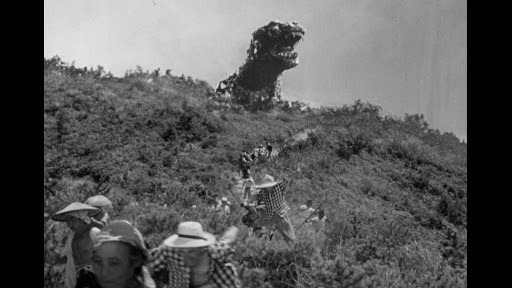
I loved it. I loved all of it. Dad warned me about the ending of the ‘54 movie, so I wasn’t surprised by it, but I still cried! He got me over it by showing the the rest of them, as if to go “see, he’s okay!” Then dad warned me that Godzilla was ‘the bad guy’ again in Godzilla 1985, but didn’t tell me how it ended. I was reaaaaally upset when he fell into that volcano. I probably cried about it for three days. That scream still hits something in my soul.
My favorite childhood Godzilla movie is Godzilla’s Revenge. It’s the first Godzilla movie I ever owned. I loved Ichiro’s dreams of making friends with Minya, outsmarting his kidnappers and standing up to his bullies. I even tried to pick up Monster Island using a little portable am/fm radio I had as a kid. It didn’t work, all I got was static, but I sure tried! 😋
I wanted to be an island lady like Saeko from Son of Godzilla who could call monsters for help. I wanted to be a cyborg like Katsura, except I would use MechaGodzilla to make friends with Godzilla instead of trying to hurt him.
Anyway...
Dad’s interest in Godzilla stuff kinda dropped away as the 90s hit and my autistic traits began to make me deviate more and more noticeably from my peers. I had seen all the Showa era movies, so he stopped telling stories because there weren’t any more to tell.
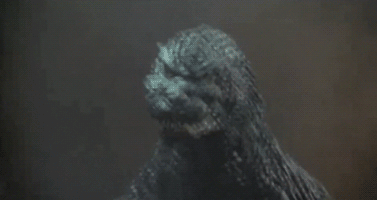
My love for Godzilla carried on into the Heisei era and beyond. Dad acted like I should “leave that crap behind” when I kept buying movies and talking about them to him. He didn’t want to watch them with me or look at pictures in the Godzilla Compendium I picked up.
I didn’t stop my enthusiasm for Godzilla, I just stopped sharing it with dad. I kept at it through high school. I sobbed over Godzilla vs Destroyah because I thought that was the end of the franchise, and I can’t even mention what happened to Godzilla in that movie. If you’ve seen it, you know.
In the year 1998 the rumblings for the ‘98 movie started around New Years, so of course I made noise about going to see it. Because GODZILLA, y’all!
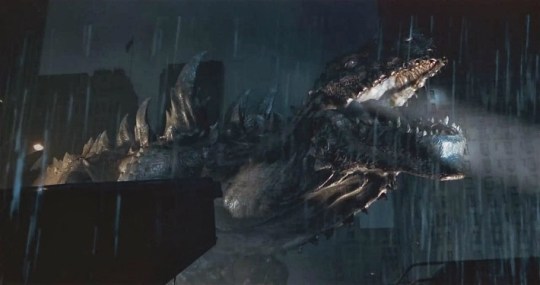
Well, dad surprised me and took me to see Godzilla ‘98 when it came out. I had been bugging about going to see it and he kept giving me a hard no, then had me convinced we were going to a baseball game that night instead. I did nothing to disguise my boredom or hurt in the car, and it broke when we pulled up to the theater. Okay, he pulled a fast one on me and he said I did an emotional 180 spin, but it was worth it. (I still like that movie, but I don’t call that creature Godzilla. I call him Zilla or GINO instead.)
Literally right after that my dad would get mad if I talked about Godzilla. He griped that I was “so obsessed with that stupid monster” and that I needed to grow up. I was almost 18, and I had, just not the way HE wanted, I guess...
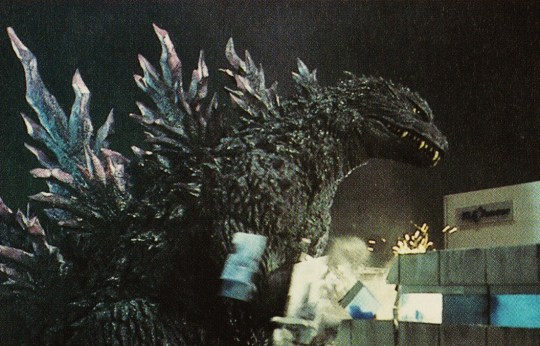
Godzilla 2000 came out. Dad grudgingly took mom and me to see it, and I finally got to live my dream of seeing a legit Toho Godzilla movie in theaters. I was yelling and clapping (as were other people) and just had a huge blast. In the car, he told me to knock it off when I talked excitedly about what I liked in the movie. He slapped down all talk of Godzilla.
I still continued to be a fan. When more Millennium era movies came out, I grabbed them when I saw them on the shelves. I got everything from Godzilla vs Megaguirus to Godzilla: Final Wars in a little Japanese shop my dad found near where he worked at the time. I was in my early 20s then. I also got some figurines from that store: a Heisei era Mothra, a Heisei era King Ghidorah and a Millenium era (Final Wars) Godzilla. Dad rolled his eyes when I walked out with them in my arms.
And so began his weird pattern of indulging my interest, but getting upset at me if I talked about it. I was discovering the online fandom at this point, so I had another outlet, but still, it used to be our thing, and his behavior really stung.
I only discovered there were more movies in the Millenium era becuse I happened across GMK on HBO and realized I didn’t recognize that Godzilla suit or the setting.
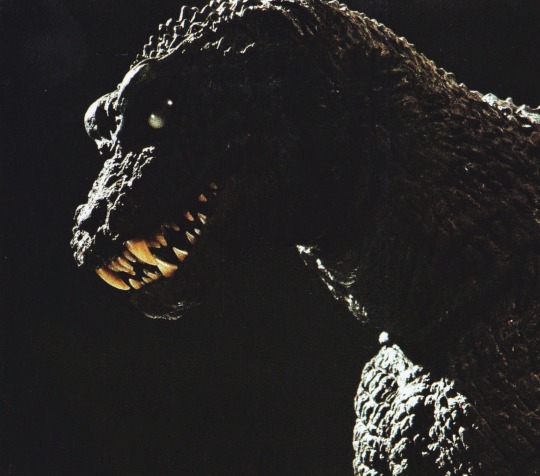
Then I missed the ending because of a very badly timed phone call. But I was like “omg more Godzilla movies...hey dad, can we go to that shop?” (And then I was like a dragon with treasure when I came home....)
I grabbed the two Kiryu movies first because a certain fanfic author in the fandom had written some Mechagodzilla fanfics where Kiryu (Kiryuu in her stories) was sentient and sexy af. The idea of the original Godzilla being brought back as a robot was amazing and that author basically took the idea and ran it to another level. She’s the reason I headcanon the 54 Gojira as Heisei Godzilla’s dad.
ANYWAY, I got all caught up on the Godzilla movies and blew up to a boiling fan girl froth when the 2014 movie got advertised.
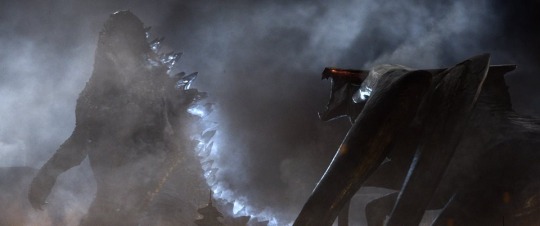
I took mom to see that becuse dad’s Parkinson’s had advanced so far that he couldn’t go out much anymore. Mom likes Godzilla movies and sci-fi in general. While she’s not as into it as me, she enjoys them for the entertainment. We both liked G2014, so I got it for Christmas.
We watched it with dad as a family, he said it was okay.
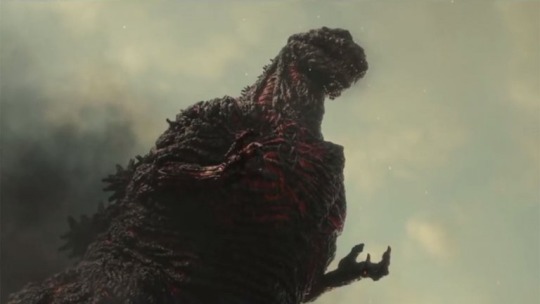
Through 2016 and 2017 I was rattling on about Shin Godzilla. Got that as a late 37th birthday gift because it came out on dvd a few days after my actual birthday. I watched it for the first time with dad, and he complained the whole time and kind of ruined the experience for me, which pissed me off. HE was the one who wanted to watch it with me, now I wish I watched it alone instead.
2019 came, KOTM happened. So that brings me to sitting down to watch it with dad. I was excited see his reaction to the monsters he introduced me to in childhood realized with modern cgi effects and all. I love seeing things that remind me of happy times in my childhood, and I thought those memories were fond for him, too. So I watched, waiting for him to recognize Mothra, Rodan and King Ghidorah.
He said nothing when they came onscreen. I got engrossed in the movie and sort of forgot about it, but when it was over I bounced up and asked, “Wasn’t it cool to see the guys you told me stories about when I was 5?”
I thought back while I waited for him to answer. I thought back on the stories, the fun and the movies.
I thought back on how my love for this character has grown, and how in KOTM it was physically realized in that painful moment when Ishiro Serizawa looks up at Godzilla with such reverence and lays his hand on his snout. I feel like that was Dougherty telling all the fans he sees their love for Godzilla and gives them that one singular, intimate audience with the big guy through Serizawa. Because who wouldn’t want to give him a pat on the nose and thank him?
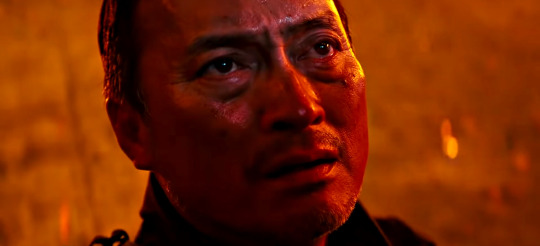
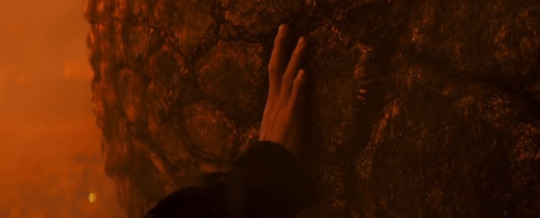
The director of KOTM understands what Godzilla means to the fans. He understands how they feel and what they want. In my mind he gave it in spades.
But my dad...
My dad, the man who taught me enough to get me into Godzilla forever, looked at me in the eyes and said, “I don’t remember any of it. They’re not that important anyway.”
“These are important characters.” Much younger dad said to much younger me.
“They’re not that important anyway.” Older modern day dad said to older modern day me.
I thought my heart had stopped and my soul fled through the floor. This franchise, these characters he brought to me with such enthusiasm, something that grew into a lifelong love, meant nothing to him. It was as if he gave me a diamond and later told me it was worthless glass to him. Godzilla was and still is a huge part of my life and who I am, and dad acted like this “us” thing I thought we bonded over during my childhood didn’t matter to him.
It’s almost like he expected me to take passing interest and then move on, but because I’m autistic and because I relate to Godzilla so much, my interest turned into love and respect for the character, what he represents and the messages he has sent throughout the years.
Part of who I am is shaped, literally, by Godzilla, something that started because my dad told me he existed. And in a sentence my dad took that root from my childhood and ripped it out because he decided it was a worthless weed.
It’s not my love for Godzilla that was ripped out. It’s the love I thought my dad felt for me when he was telling me all those stories and showing me the movies. I’m sharing this because I love Godzilla, because I love what he represents and means to me, and I thought my dad shared it with me for the same reason. This is a very autistic thing...I’m sure autistic readers can feel my love for Godzilla just by reading this.
I thought my dad did, too, once.
But no. There was no love at all like I thought there was, so I was not pouring my love into an ocean that still existed, I was throwing it into a black hole.
Dad didn’t care to remember Rodan, or Mothra, or King Ghidorah. He didn’t care to remember what all that meant to me during my childhood because he doesn’t and never has cared about my feelings.
He doesn’t care about my feelings.
He wants me to shut up about Godzilla.
I will not.
I love Godzilla. I don’t need dad’s approval anymore. I will turn 40 this year (2020) and there is no stopping what began 35 years ago. The plant that grew around the root dad planted is shaped like me now, and like Biollante I will keep blooming because Godzilla was my first love fandom-wise and that admiration and love for him stands on its own.
Dad no longer has a say.
But, my God, my dad has this remarkable ability to tell me something is important when I’m young and then claim it isn’t so many years later. He’s done it for a lot of things, but hearing him say Godzilla isn’t important after instilling his importance into me at a young age just...gutted me...and it gutted me as much as the time he asked me what I did to make kids bully me when I was being bullied as a teen.
I got bullied because I’m autistic. I existed. He said it was my fault for being that way. I was a newly diagnosed teenager when he said that. It was 1995, ironically, the same year Godzilla vs Destroyah came out.
And I was an adult when he ripped at that root of Godzilla he planted in me.
Godzilla was the last part of my childhood that he hadn’t sunk his abuse into, but he finally did in January of 2020. Now there is no part of my life untouched by his emotionally abusive crap.
It shouldn’t hurt like this. I feel ridiculous to be hurt so deeply, but I can’t keep pretending that I’m not hurt by it anymore.
I will get over it. My absolute love and respect for Godzilla is something my dad can never destroy no matter how much he tries to shit talk about it. I’ve let him ruin so many things, but not Godzilla.
Godzilla will never be a trigger for me. He is an anti trigger. On this day of April 19, 2020, I’m realizing he is the protector my dad failed to be.
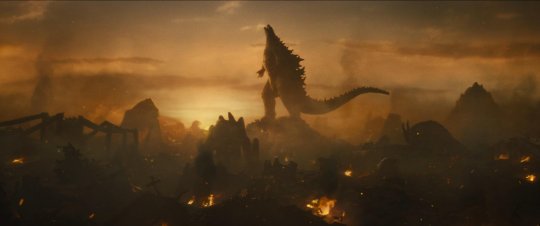
To all parents of autistic kids, be careful that you don’t belittle the things you said were important when they were young. Don’t introduce something that becomes a special interest, say it’s important and then belittle it when they grow up.
Even if you don’t think it’s important anymore now, even if you think it’s silly now, even if you didn’t know they were autistic at the time and would dive in like that, it may still be important to them.
It may become their safe place. It may become treasure.
Don’t try to destroy that safety. Don’t treat it like trash.
#actuallyautistic#special interest#godzilla#emotional abuse#gaslighting#dad issues#swearing#ableism#gifs#long post#tw emotional abuse#tw gaslighting
59 notes
·
View notes
Text
August 13: Murphy/Raven, A Weaker Man Might Have Walked Away
Murven, Modern AU, ~600 words, for @easilydistractedbyfanfic
90s/2000s song inspo: #22, What a Girl Wants - Christina Aguilera
Why pick a Christina song when I had another number I could use? Because #113 was Heartbreaker by Mariah Carey and that seemed even harder.
I had a different idea for this but I thought it was too melancholy and then it ended up being melancholy anyway, so! Oh well!
Written for my series of 90s/2000s inspired fics, from my Nostalgic Childhood Music Playlist
My tag list: @ciewill @dealingdreams @shadowheron2013 @julyrubyrose @wonderland-promises @hanav @rycewritestrash @thelittlefanpire @musicnote902 @stonybnatural @earthgay2052 @fabianapvec a @bellarkehastakenovermylife , @bellarkewriting (lmk if you would like to be added to or deleted from this list)
*
This isn't a breakup because they were never together. They just need to stop doing this: hooking up, usually at his place, but also the long text chains, and calling each other late at night. She needs to stop thinking of him as her go-to person. She needs some space.
Raven expects him to argue but that's just her ego talking—he's Murphy, so of course he doesn't. "Whatever you say, Reyes," he says, instead, leaning back into the corner where the headboard meets the wall and watching her get dressed for the last time. Murphy doesn't stare at her like other men stare. His gaze is harder to read. She sees desire in it but also something else, a lazy appreciation, a certain patience. It's late at night but she doesn't want to stay until morning. As she grabs her hoodie from the back of his desk chair, a long beam of headlights from the road glides across the room; the sound of a truck speeding by disturbs the silence. She'll miss the sound of traffic outside his window and the way he never asks her to stay or forces her to go, but she can't have any regrets, not now that her mind has is made up.
She figures he'll start seeing someone else before long, but he's either remarkably faithful or remarkably discreet. She doesn't even hear any rumors, and despite herself, she does ask.
For a while, she spends her weekends at home, works on projects, goes more often to the gym, takes on longer hours at work. Clears her mind, or tries to. "I don't understand what the problem is," Octavia says, once, after Raven throws her phone in the direction of the couch cushions ("Don't let me text him"), but she sounds so bored, no more than vaguely interested in Raven's love life, as ever, that Raven doesn't bother to respond. She sinks down into the armchair and props her heels up on the coffee table. Octavia flips another page in her magazine.
"I mean," she says, after a long while, "you seemed like you were having fun."
Raven stares up at the ceiling. She's too bone-tired to go searching for her phone.
"I guess the problem," she answers, "is that it felt too serious."
"Hmm." Octavia flips forward several more pages, scanning the columns of print. Her lips are a thin, judgmental line. "That's idiotic."
Raven could find another man, or a woman, and remind herself again what not-serious feels like, because it's been a while. Nothing with Murphy felt fleeting or random. Not even the intense but shallow love she had for her high school boyfriend, a boy she'd briefly thought she'd burn the whole world for, turned her inside out like drinking a post-dinner coffee in the narrow little cafe with the dim lights, and the deep couches, and Murphy's arm around her, and the low buzz of conversation between them fizzing out into a deep but pleasant quiet. Moments like that scared her. Made her feel like maybe she was a person who was capable of loving after all.
And maybe at night with the window open, listening to the wind blow hard and violent, threatening an early autumn storm, she imagines that she'll find her way back to that feeling again, but wiser this time, braver, unafraid. She imagines that he'll still be waiting for her.
She turns her phone around and around in her hand.
Hey Murphy?
Doesn't expect a response. But maybe that's her ego, too. She sees him typing, and she turns on her side, toward the window, breathing in the violent humidity of the air.
hey reyes
She imagines that he hasn't given up on her. And maybe, in this bit of quiet optimism, she is right.
#the 100#murven#raven reyes#john murphy#mine#my writing#the year 2019#2019: free write#2019: answers#nostalgia songs#leaving this here and then going away#for the day
14 notes
·
View notes
Note
What are your favorite memories from watching season 1 of Ed, Edd n Eddy?

Ah, the ’90s (and early 2000s). Nostalgia is once againhitting me like a pillowcase stuffed with a ton of bricks. I had to revisit my childhood favourite last night for pure nostalgia’s sake, and looking back at the show through the lens of an adult, it’s no wonder why it had a relatively long life from 1999 to 2009. Now, I wasraised on Cartoon Network (because it broadcasts in India, too; it was actually my country’s first kid’s channel in 1995). Though I enjoyed a good majority of the shows thataired between the late ’90s and early 2000’s (including but not limited to Foster’s Home for Imaginary Friends, The Powerpuff Girls, Dexter’s Laboratory, The Grim Adventures of Billy & Mandy,and Codename: Kids Next Door), allgreat shows, mind, none of these titles were quite so wacky as Ed, Edd n Eddy. EEnE was not as artisticallyendeavoured as Samurai Jack (2001-2004,recently rebooted in 2011) or the original Teen Titans(2003-2006), two shows that were targeted at the big kids, and the storytellingwas not nearly as absurdly unsettling and atmospheric as Courage the Cowardly Dog (1999-2002; its original short film whichwas nominated for an Academy Award). Yet, it was unconventional in its own way,and an artistic milestone, if I may be so frank. EEnE broke boundaries in waysthat animation hadn’t quite attempted before or since, and it still resonateswith me today as a 28-year-old post grad English major (with a hobby in animation). I believe EEnE has thatimpact on a good majority of millennials of my generation. Whereas many people regard SpongeBob as the modern day equivalent of The Looney Tunes in its cultural impact and popularity, I think a lot of kids of my era will think otherwise. I love SponeBob, but EEnE, to me personally, is a classic in its own right, a classic that never truly died. I won’t say it’s an underrated gem, though; the cult following is enormous! It’s a show I keep returning to for nostalgia and comfort, a show I can watch again and again and relive the memories of my idealistic and troubled youth. Much to everyone’s surprise, the show was one of Cartoon Network’s mostsuccessful and popular, seeing as it lasted awhopping ten years, which secured its legacy as the longest-running CartoonNetwork original series at the time. So whatmakes EEnE so special?

I was nine-years-old when the show premiered in India on 22 August, 1999. (Yes, it was dubbed in Hindi; years later I discovered the English version on YouTube and I much prefer it.) I remember going to a friend’s house to watch it because I didn’t have a television set. I was born and raised in rural Jaipur, Rajasthan on my Dadiji’s goat farm, so us kids had many responsibilities before and after school. We didn’t have much time for the telly, but it was a luxury after our chores and homework was completed. EEnE was a nice escape for me, even if the kids in the show didn’t exactly live the life I did, but that’s what I liked about it. As much as I love my country, I didn’t want to watch the daily life I knew of hard work and blazing sun. I wanted to pretend like I lived in the quiet suburbs of an undefined Western country, spending lazy summers doing absolutely nothing (except to conjure up ingenious ideas to swindle the allowances of your poor, unsuspecting peers). Of course, one of the kids on the show happened to live on a farm (Rolf), and that’s what makes EEnE so universal, no matter what country you’re from. Sure, my childhood village didn’t look like the cul-de-sac of Peach Creek, nor was I surrounded by people of diverse backgrounds and colours, but though EEnE seemed to be more pandering to American and Canadian audiences, I never once said to myself, ‘’No, I can’t relate to these characters; they don’t look like me or share my culture!’’ Nope, not once. The thought never crossed my mind. I immediately fell head over heels for the three pre-teen protagonists. They were as differing in personality as they were ridiculous and charming. I don’t need characters to look like me in order to relate to them. (In fact, maybe that’s why I didn’t pay as much attention to Rolf upon my first viewing–perhaps he reminded me too much of myself and I tended to ignore him.; he was a foreigner to the characters in the story, not necessarily to me, so he wasn’t that interesting to me as a child, even if I do find European cultures fascinating. Luckily times change–I’m proud to say that he’s one of my darling favourites now. And no, contrary to popular belief, Rolf is NOT Indian or South Asian, I beg to differ.)

No, I was not the exact age of a middle schooler when I first started watching the show (I was still in lower primary school which is the equivalent of elementary school in the U.S.), but ironically enough, I could still relate. I was old enough (and I started puberty fairly early, which isn’t uncommon for children living in developing countries). I remember my initial excitement… the network advertised the living hell out of the show.
youtube
youtube
It didn’t look like anything I’ve ever seen before. I remember it was a lot better than I anticipated; I still, to this day, think it’s the funniest show that ever graced prime-time television. After all these years, it still makes me laugh. ‘’The Ed-touchables’’ in particular, is comedy gold (more on that later). I didn’t have the happiest childhood, but I won’t say it was the worst either. Much like the kids in EEnE, my childhood wasn’t Walgreens Perfect, sugar-coated or ideal; it wasn’t like the ‘’Save the Children’’ ads either. It was just somewhere in-between, back in the day before cell phones became popular, back when children had no limits to their imagination and played outside, back when times seemed simpler in our fond recollection, but was it really? Life became worse for me around 13, 14, after we sold the farm and relocated to the city, so I associate EEnE with happier times on the farm, when my Dadiji and Papa were still alive, when the family was still together. EEnE got me through my worst years; it gave me a piece of mind, so it will always hold a special place in my heart, with its ugly grotesqueness, salty, greasy rule-breaking agenda and otherwise high-cholesterol self-indulgent art style to dry those tears and put a smile on my face. Ronald McDonald who?

Don’t ask. It’s an Ed thing.
68 notes
·
View notes
Text
I do hope that a dedicated service or company is started that will replace what people used to get from porn on Tumblr. It may already exist and I don’t know about it. They’ll have an uphill battle under current regimes, and if you think that’s a bad thing please try to change the regimes. Don’t attack companies following legal and business realities as they exist.
This is called acquiescence and complicity.
This is the equivalent of the “Don’t Be Evil” being taken down at Google. Eventually, this turns into “we have to collect your data and sell it to third parties because it is a legal and business requirement.” and you better believe that you see and hear this being rolled out to “identify” sex workers.
One of the things that irks me about this post by the Tumblr Powers That Be is that it acts like or pretends like the 2000s web was more porn permissive than the 2022 web. If we limit the world wide web to the US then in some ways it is, but Internationally--and as many users on Tumblr remind people not everyone on Tumblr is from the US--Tumblr exists in the same ecosystem as it did when it first was created. Tumblr was created during the era of International defiance and uprisings against the imperial orders where the pirate party fought media corporations for control of the web, to protect users from having their data stolen and sold, to make sure that sex workers had a place at the table and weren’t forced to homelessness because some corporate prudes peer pressured each other.
It was always a reality that certain top level regulators particularly controlled by authoritarian billionaires in the US were anti-sex-worker. There was a time before PayPal when sex workers couldn’t deal through payment processors; the sex workers had to come up with whole new ways of banking and we all benefited from their work and their new ways of banking. A lot of the “you must identify and verify who publishes on your platform and who uses your platform” stuff existed all the way back to the 90s; it existed when Tumblr was first formed. Requiring consent of people to have their photos taken and published was the law in the US back then as it is now; there have been age verification requirements all throughout my childhood and adulthood; in the late 90s and early 2000s, Mastercard and the traditionalist payment processors fought to require people have and use credit cards to access porn, and the users and the sexworks rebelled against this for obvious reasons that predictions have seen vindicated. The originators of this platform took calculated risks and acted in defiance of the imposed but often unenforced norms, and they fought for the user.
- tumblr doesn’t sell your private data - tumblr doesn’t harvest your microphone audio, your unsent message drafts, a list of your apps on your phone, your GPS, your clipboard, the times you turn on screen on your phone, and other things - like literally every other app does (especially tiktok) to some degree - “if you don’t pay, you’re the product” is still valid, you generate the content that attracts people, but he’s vaguely correct in that you cost the company ~$7 a year (probably even w/o NSFW content being allowed) even without employee salaries and stuff. - remember that facebook, instagram and similar *make* in the ballpark of $20 from you per year; more if you are active and click ads. - tumblr, however, not being a multi-billion media conglomerate, is in no place to bargain, and even if it was, it will still gladly rat out all your details to government privacy-invasion and violence-enforcement agencies. Friendly corporations aren’t your friends.
tl;dr this isn’t the 90s. you can’t photograph people on the street anymore.
1) technically, you couldn’t photograph people on the street, and often enough, people still do especially journalists and police.
2) Automattic is just a temporarily embarrassed multi-billionaire media conglomerate with ambitions to be the next Facebook and Google. Their people might be marginally better than the people running Facebook and Google, but I’ve watched this pattern enough and lived through enough of these corporate musical chairs games to know that nothing particularly special about Automattic and WordPress is going to prevent them from corporate shuffling to go almost instantly from “not objectionable” (I do have objections to the WordPress people and technology) to the usual US corporate manels that just happen to align themselves with supremacist political ideologies and engage in “necessary evils” like purging sex workers (while losing an order of magnitude of profit in the exercise of political power).
It is only a matter of time before Automattic undoes all the shenanigans that original devs left in place to frustrate precisely the transformation that is being made by the present corporate developers. There will come a day in the not too distant future where the people at Automattic or whoever they sell us to next has finally “cleaned up” and “fixed” the SYSTEM TM, and from that point onward, we’ll see all the design decisions that were made specifically to prevent enforceability of all the things that the corporate officer (Corporate Matt) here says they have to enforce.
3) The fact that most social media sites make like 20$ a user is why Automattic bought Tumblr at the garbage fire sale price that Verizon sold it at. Corporate Matt lays out the numbers. If they put in the work to make Tumblr like all the other social media sites then they’re looking at pocketing MORE than 7$ per person in profits, and they’ve done the calculus; they’ve decided that sex workers and clients are not worth it. 7 million dollars per 1 million users means that Automattic is aiming at higher than 7$ a person by a significant margin, and their corporate calculus tells them that making Tumblr work for sex workers wouldn’t pay them enough to be worth the effort as they’ve estimated it.
This means that Automattic is seeing a lower cost for turning Tumblr into Popular-with-the-Youth and Compliant with Google and Apple App Store and Compatible with Mastercard TM social media site that pays them 20$ a user and costs less than 7 million dollars per 1 million users. You know what I learned in my intro to business class from a corporate lawyer? If you can do something and penalty is a fine that costs less than the profit you make then you do the thing even if it is illegal; benefit-cost analysis is how the corporation thinks and acts, and all the rest like this post is just how individuals justify things to themselves or PR and marketing.
4) What Corporate Matt here has said is that we actually cost less than 7$ a user and they’re driving that cost down by cutting the sex workers out and making the site more compliant with US fascist/authoritarian/puritanical laws (they’re scared of Texas taking the site down and them losing their investment).
5) All of the following
- tumblr doesn’t sell your private data - tumblr doesn’t harvest your microphone audio, your unsent message drafts, a list of your apps on your phone, your GPS, your clipboard, the times you turn on screen on your phone, and other things - like literally every other app does (especially tiktok) to some degree
Is given a foot note. YET. They ostensibly maybe don’t do this. YET. It is profitable for them to do all of this, and all the sites that they’re trying to get Tumblr to hook into and comply with will and do absolutely harvest people’s data and metadata and sell it for fun and profit. Which means that Tumblr will be when they’ve reached their objectives complaint to interface with those very same services.
Automattic are cowards, and they do not fight for the users.
Why “Go Nuts, Show Nuts” Doesn’t Work in 2022
For those who don’t know or remember, Tumblr used to have a policy around porn that was literally “Go nuts, show nuts. Whatever.” That was memorable and hilarious, and for many people, Tumblr both hosted and helped with the discovery of a unique type of adult content.
In 2018, when Tumblr was owned by Verizon, they swung in the other direction and instituted an adult content ban that took out not only porn but also a ton of art and artists – including a ban on what must have been fun for a lawyer to write, female presenting nipples. This policy is currently still in place, though the Tumblr and Automattic teams are working to make it more open and common-sense, and the community labels launch is a first step toward that.
That said, no modern internet service in 2022 can have the rules that Tumblr did in 2007. I am personally extremely libertarian in terms of what consenting adults should be able to share, and I agree with “go nuts, show nuts” in principle, but the casually porn-friendly era of the early internet is currently impossible. Here’s why:
Credit card companies are anti-porn. You’ve probably heard how Pornhub can’t accept credit cards anymore. Or seen the new rules from Mastercard. Whatever crypto-utopia might come in the coming decades, today if you are blocked from banks, credit card processing, and financial services, you’re blocked from the modern economy. The vast majority of Automattic’s revenue comes from people buying our services and auto-renewing on credit cards, including the ads-free browsing upgrade that Tumblr recently launched. If we lost the ability to process credit cards, it wouldn’t just threaten Tumblr, but also the 2,000+ people in 97 countries that work at Automattic across all our products.
App stores, particularly Apple’s, are anti-porn. Tumblr started in 2007, the same year the iPhone was released. Originally, the iPhone didn’t have an App Store, and the speed of connectivity and quality of the screen meant that people didn’t use their smartphone very much and mostly interacted with Tumblr on the web, using desktop and laptop computers (really). Today 40% of our signups and 85% of our page views come from people on mobile apps, not on the web. Apple has its own rules for what’s allowed in their App Store, and the interpretation of those rules can vary depending on who is reviewing your app on any given day. Previous decisions on what’s allowed can be reversed any time you submit an app update, which we do several times a month. If Apple permanently banned Tumblr from the App Store, we’d probably have to shut the service down. If you want apps to allow more adult content, please lobby Apple. No one in the App Store has any effective power, even multi-hundred-billion companies like Facebook/Meta can be devastated when Apple changes its policies. Aside: Why do Twitter and Reddit get away with tons of super hardcore content? Ask Apple, because I don’t know. My guess is that Twitter and Reddit are too big for Apple to block so they decided to make an example out of Tumblr, which has “only” 102 million monthly visitors. Maybe Twitter gets blocked by Apple sometimes too but can’t talk about it because they’re a public company and it would scare investors.
There are lots of new rules around verifying consent and age in adult content. The rise of smartphones also means that everyone has a camera that can capture pictures and video at any time. Non-consensual sharing has grown exponentially and has been a huge problem on dedicated porn sites like Pornhub – and governments have rightly been expanding laws and regulations to make sure everyone being shown in online adult content is of legal age and has consented to the material being shared. Tumblr has no way to go back and identify the featured persons or the legality of every piece of adult content that was shared on the platform and taken down in 2018, nor does it have the resources or expertise to do that for new uploads.
Porn requires different service providers up and down the stack. In addition to a company primarily serving adult content not having access to normal financial services and being blocked by app stores, they also need specialized service providers – for example, for their bandwidth and network connections. Most traditional investors won’t fund primarily adult businesses, and may not even be allowed to by their LP agreements. (When Starbucks started selling alcohol at select stores, some investors were forced to sell their stock.)
If you wanted to start an adult social network in 2022, you’d need to be web-only on iOS and side load on Android, take payment in crypto, have a way to convert crypto to fiat for business operations without being blocked, do a ton of work in age and identity verification and compliance so you don’t go to jail, protect all of that identity information so you don’t dox your users, and make a ton of money. I estimate you’d need at least $7 million a year for every 1 million daily active users to support server storage and bandwidth (the GIFs and videos shared on Tumblr use a ton of both) in addition to hosting, moderation, compliance, and developer costs.
I do hope that a dedicated service or company is started that will replace what people used to get from porn on Tumblr. It may already exist and I don’t know about it. They’ll have an uphill battle under current regimes, and if you think that’s a bad thing please try to change the regimes. Don’t attack companies following legal and business realities as they exist.
22K notes
·
View notes
Text
Muja 'redesign' attempt thing
So here are some pictures of my attempted Muja Kina redesign (hi, I’m the anon from earlier) before I get into some headcanons for her I wanna really apologize for how crap the quality is, these are really sketchy and I did these in my sketchbook and had to take pictures with my mom’s not so great phone and tried my best to make them clear and where you can at least see some of the details. So I did this redeisgn because I really love Muja as a character, she reminds of me of a school nurse from my childhood who holds a place in my heart and I just really hate her as a rival and ‘love interest’ for senpai, it’s gross and tasteless no matter what yall say to defend it. So with all that said here are some fun things I came up with for her. Muja Kinda (couldn’t think of a better name) is in her mid to late twenties, she’s a motherly and comforting addition to Akademi Academy. She hopes that filling in for the teacher will either become long term or lead the way for more nursing opportunities for her. She’s short She loves all the students and staff and treats them as if they were family. Upon seeing Taro/Taeko depending on how you choose to eliminate your rivals she will be extremely worried not just for them but also for Ayano and try her hardest to comfort both. Her office is covered in lots of those cheesy motivational posters as well as a bunch of meme-y lame ones like you’d see in those late 90’s early 2000’s school videos. She gives out lollipops to each student who comes into her office and also keep snacks to give to students who may not have had time to eat breakfast or don’t have much to eat at home. She has a big fluffy cat named Birb at home (despite being allergic) and loves to show pictures of him to the students and staff in her free time. To unwind after work she likes to watch dramas and shows like The Office, Scrubs, Brooklyn 99 and Jenna Marbles. She’s naturally paranoid and if you have eliminated rivals via murder until up to when she comes to the school it’ll just heighten her paranoia making it harder for you to eliminate her as she is almost always on guard. You’d have to gain her trust to be able to eliminate her. Since a lot of people do rewrites of her character in game in relation to Ayano and senpai, I thought it’d be more fun for me to just write out some head canons. I plan to redraw her and take better quality pictures as well as work more on the redesign whenever I can one day. Anyways sorry this is so sucky and long, I was bored and decided to do this after talking about her. Hope it isn’t too horrible and sorry for any spelling mistakes
SORRY i’m so late replying to this i’m really inactive here now that college has started jgjgj but THIS IS SO LOVELY I LOVE ALL YOUR HEADCANONS I CAN’T EVEN PICK ONE I JUST LOVE THEM ALL
for some reason the images won’t load but i’m sure she looks lovely!! thank you for taking the time to write and send me this it’s so sweet i’m sorry it took me so long to reply lmaofjkfj
21 notes
·
View notes
Text
The Best Music of 2018
2018 was a strange year for me. It should go without saying that the politics were grim, as the United States continued to embrace gestapo-esque tactics and concentration camps as a way of dealing with the “immigration crisis” (a lot of this happened under Obama too of course). The planet continued to slide into a dystopia of global warming as more and more animals became endangered or went extinct all-together. The mid-terms happened, with typically mixed results. Elon Musk called someone a pedophile on twitter for some reason.
On a personal level, in 2018 I moved to Ohio from Oregon (again). My band put out an EP. And I lost my father, something that I still grapple with on a daily basis, though it gets less present over time.
I’ve become interested in how I discover new music, as I’ve gotten older and can’t really consider myself to be fully plugged into any sort of youth culture, sub or otherwise. Finding new music has become a very intentional process; if I didn’t seek it out deliberately, I probably wouldn’t end up hearing much of anything. But that’s always kind of true for arty-weirdos like me.
For better or worse I discovered a lot of music the last two years through Youtube. As you probably know, if you play a song or an album on Youtube, there’s an autoplay feature that will automatically play something else when it’s done. I’ve found a lot of my favorite music lately this way, and in some ways it’s kind of filled the role that “cool record store clerk” or “late-night college dj” might have filled in the times past. This is not necessarily a good change. I’ve heard you can find a lot of white supremacists that way too.
Youtube has also become invaluable if you’re someone who wants to make a list like this one, and can’t afford to spend hundreds of dollars on albums. I think sometimes the artists even get paid a minuscule amount for the clicks! Hooray free information! I hope we can all find decent jobs someday.
1) CAMP COPE - HOW TO SOCIALISE & MAKE FRIENDS
I debated with myself about whether to put Camp Cope at number one, as they’re not the most musically complex or adventurous of my favorite albums this year. However I can’t think of another band that felt like it lyrically captured the zeitgeist of the times in such a powerful way. The whole album is great, catchy and upbeat jangly indie/punk with tinges of early 90s midwestern emo, made by three woman from Melbourne, Australia. Singer Georgia McDonald has a great voice, imbued with urgency, and her accent is a lot of fun to listen to too. Her lyrics have that same emotional rawness and honest specificity that early emo has as well - on “The Omen” she sings about loving someone since they were 17 and wishes for rescue dogs and a house by the sea, while on “I’ve Got You,” she bounces from the death of her father to police shootings, the loss of her childhood home, and the grappling with mental illness, and it all feels thematically relevant as this great moment of exhaled catharsis.
The stand-outs for me, however, are “The Opener” and “The Face of God.” “The Opener” is a scorching indictment of the indie music scene, as McDonald calls-out all the garbage women in bands have to deal with, from accusations that they only succeed based on their gender, to men continually explaining things, to men showing up to lay down a big steamy pile of unrequited love BS. These aren’t new observations, but hearing them all laid out in a row like this highlights their invulnerability and their ubiquitousness, the daily microaggressions that lead up to a larger picture of persistent inequality. On “The Face of God,” McDonald narrativizes the Me Too movement from the perspective of an abused fan, musing “could it be true? You couldn’t do that to someone. Not you, nah your music is too good,” her tortured delivery capturing the rage, shame, disbelief, and sadness of all the Me Too revelations about artists that we liked, and who abused that power again and again and again and again and again and again and again an
2) IDLES - JOY AS AN ACT OF RESISTANCE
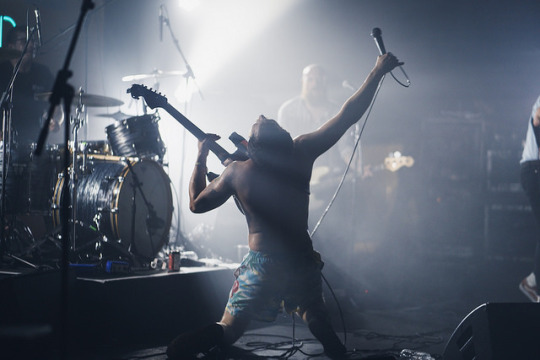
Image by Paul Hudson via Flickr
Idles was one of my favorite discoveries of last year. I was actually a little concerned with this album since I’d heard the band was “embracing positivity” , and what I loved about Brutalism was their raw, unhinged sound and clever but cynical and pissed-off lyrics. There’s also a recurring thing for me of finding a really cool raw sounding band, punk adjacent but not necessarily fully in the scene, who then get less “punk” (and to me, less interesting) with each subsequent release as they sort of turn into just another indie dude band who like Big Star or the Replacements. This band sounds raw as fuck, I’ll say, and then later they’ll put out their fucking mandolin album.
Joy as an Act of Resistance is dope though, as their music continues to embrace a raw, chaotic sound of guitars that both swirl and jab like shards of glass, pounding “Lust For Life” toms, and stripped down basslines, while frontman Joe Talbot howls sarcastic indictments of masculinity, homophobia, and racism. In a similar way to last year’s Pissed Jeans album, they tackle ugly toxic masculinity with ugly, tough sounding music, hearkening back to a punk rock that was less rigid in sound. There’s this infectious positivity that runs through the whole thing however, a joy that comes from casting off the fixed roles that the patriarchal society tries to put upon us and embracing our (ironically) gentler natures. “I wanna be your best ever friend forever” Talbot says, sincerely on “Love Song.” “Let’s hug it out,” he repeats on “Never Fight a Man With A Perm,” and though the song is making fun of a coked out bruiser, I have a feeling it’s a sentiment he would share.
3) THE ARMED - ONLY LOVE
The synthesis of hardcore punk with electronic music is something I’ve been anticipating. There’s definitely been forebearers (Horse the Band comes to mind, though there’s probably other stuff in the underground), but this is the first time I’ve heard it done so well. The Armed sound like if you took one of the better mid-2000s screamy hardcore bands and mixed it with the noisiest and most frenetic parts of a chip-tune song. That may sound like a nightmare to a lot of you, but again, it’s done so well here that it just sounds like a noisy chaotic mess in the best and most elegant possible way. This is not to underplay the tightness of the song-craft at work here - the chaotic sound seems to me to be carefully orchestrated. Glitchy, brutal, climatic, and beautiful. (And the parts where the lady sings remind me of Blatz. The world could use more Blatz.)
4) SCREAMING FEMALES - ALL AT ONCE
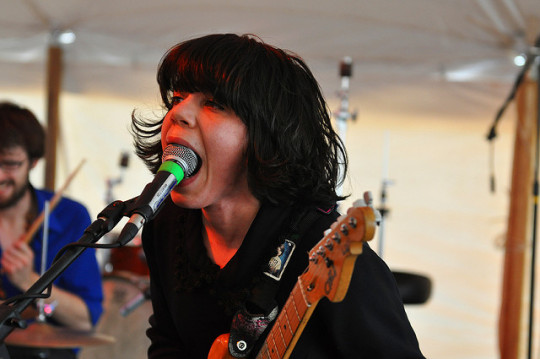
Image by Jason Persse via Flickr
This band is kind of a mainstay on my year end list at this point, but I feel like they continually top their previous efforts, a rare quality for most bands. Incredible vocals, incredible song-writing, incredible guitar playing, as they reach ever greater levels of accessibility and hookiness, while still maintaining that slight edge that would put them forever as at home in a basement as a venue.
5) KALI UCHIS - ISOLATION
Kali Uchis lands at that sweet spot where pop, hip-hop, jazz, soul, and psychedelia intersect that’s occupied by similar weirdos like Janelle Monae, Miguel, and the Internet. It’s no wonder that one of the all-time prophets of future-looking pop, Boots Riley, shows up on one of the singles. There’s a real bossa-nova, latin jazz vibe on a lot of these tracks, and a kind of retro-sheen even as it pushes into the future. “It’s no fun to feel like a fool,” Kali Uchis croons while straight up wall of sound style saxophones blurp in the background. “Pussy is a hell of an addiction.”
6) THE INTERNET - HIVE MIND
Another year-end list staple for me, the Internet have been consistently putting out some of the best, solid-ass R+B since 2011. The whole thing is smooth as hell, but weird or tasteful in all the right places; the “hoo hoo” on “Humble Pie” or the building horns on “Mood.” And retaining just a hint of that old Odd Future off-kilterness around the edges. OG Dungeon Family poet “Big Rube” shows up on “It Gets Better (With Time).”
7) JEAN GRAE AND QUELLE CHRIS - EVERYTHING’S FINE
Quelle Chris is a new one for me, but I rocked Jean Grae when I first started getting into indie rap back in high school. I always wondered what happened to her since then, but apparently she’s been putting out a steady stream of mixtapes and underground releases pretty much the whole time, self releasing a lot of them through bandcamp. She’s a wicked lyricist, and her and Quelle Chris trade off bars of dense wordplay and biting commentary on the current age of “self-care” and neoliberal hellscapes over beats that are just weird enough. Much of their verses are delivered through a lens of ironic detachment, but it’s especially affecting when the irony cracks into real urgency or emotion, as in “Breakfast of Champions,” a reflection on the grueling, consistent presence of racism in America. “It’s bound to wreck your body or straight burn your body out” they muse, and then later, as if realizing the gravity of it all, “it’s like damn, shit, fuck, wow…”
Also Quelle Chris apparently taught himself to program 8-bit video games for one of the videos.
8) SELF DEFENSE FAMILY - HAVE YOU CONSIDERED PUNK MUSIC
Yeah dude, you know I like punk rock that don’t follow no rules. This is definitely more in the vein of Fugazi, or maybe even a slightly more jagged Wilco, than a NOFX or 7 Seconds, with nods to Americana and a vocal delivery that reminds me of a raspier Craig Finn. A central preoccupation of the album seems to be the delicate balance between art and maturity, made all the more so when you’re tied to a subculture that’s only “supposed” to last you through your early 20s. There’s some great lines throughout: “ “Explaining motherhood to a man, cold observation but he’s not capable of understanding; detailing math to a dog, won’t retain a word but if you’re lucky he may be a good boy and nod” and “The world’s not turning for you and the road never rises, you’re eking out a living like every other asshole” are highlights for me, but I think my favorite bit of cleverness is actually just the juxtaposition between the titles of tracks 6 and 7. “Have You Considered Punk Music?” asks one. The other: “Have You Considered Anything Else?”
9) SINGLE MOTHERS - THROUGH A WALL
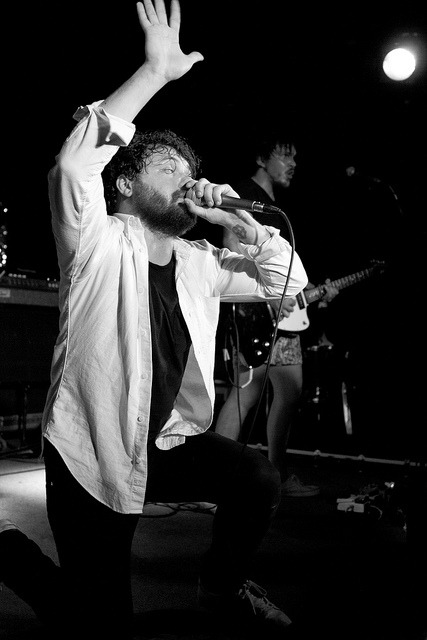
Image by CRUSTINA! via Flickr
And here we have a release that’s a little more meat and potatoes, with steam-rolling drum beats, distortion, and yelled vocals about the desperation to be found in modern life’s mudanities, “dog parks and IPA.” This album’s just some fucking ferocious non-screamy hardcore, with that same relentless quality that the best hardcore albums have. “Catch and Release” even has some double kick on it. Interestingly, I find some of the core anxieties the same as in the album above however: “Better people than you or I have lost that spark for life,” Andrew Thomson bellows on 24/7, a Cassandra portending the potential pitfalls of age.
10) HOP ALONG - BARK YOUR HEAD OFF, DOG
Singer Francis Quinlan has an incredible voice, powerful and worldly, and she paints quick snapshots of narrative with her lyrics like a Lydia Davis story. The music has shades of mid-western emo, with some kind of funky, almost Jackson 5 style guitar lines. This one is definitely a step up in terms of instrumentation from their earlier records, with strings, acoustic guitars, and other orchestral touches. The title refers specifically to a dying dog from one of the tracks, though it also seems to apply to all the characters briefly given voice throughout the album.
11) CINDER WELL - THE UNCONSCIOUS ECHO
Beautiful, haunting folk from Amelia Baker of Blackbird Raum (and a few other fellows mostly from the folk punk/bluegrass scene). A little more straight folk than Blackbird Raum’s high energy mix of folk, metal, and hardcore. Stripped down and evocative, with one foot firmly in an irish folk tradition. Like Blackbird Raum, there is a foreboding quality to much of the music, like a warning of dark things to come.
12) NONAME - ROOM 25
A micro-trend I noticed in hip-hop this year was short albums, notable from a tradition that often includes massive releases and mixtapes stuffed with skits and interludes. This is the first of example of this on my list, clocking in at a respectable 34:48. Noname is a great rapper with an intricate flow, technical without being too dense for a more casual listener, keeping her ideas and narratives clear and present over funky neo soul beats. At times she can be extremely candid, rapping about her sexual escapades, emotions, and insecurities. In one of my favorite moments, the track titled “No Name,” she discusses the spirituality behind her stage name: “When we walk into heaven, nobody’s name gon’ exist; just boundless movement for joy, nakedness radiance.” She’s funny too though. “I’m just writing my darkest secrets like wait and just hear me out; saying vegan food is delicious like wait and just hear me out.”
13) JEFF ROSENSTOCK - POST
More noisy power pop from former Bomb the Music Industry frontman Jeff Rosenstock (though I suppose by this point his solo career is at least as significant; Bomb albums never made it to Pitchfork). I think this one’s a little less varied than “Worry” before it, and a little rawer around the edges. The title is seemingly referring to the time post-2016 election, though it seems to often be more interested in profiling the anxious mood than making specific political points (which you probably all know anyway). I can’t think of another song writer off the top of my head that more consistently exemplifies the anxieties of the millennial generation, whether it’s the mid-20s woes of joblessness and friend loss often detailed in Bomb the Music Industry, or this current outing. On “Yr Throat,” he talks about the ease he has talking about relatively frivolous matter like video games and vinyl records, verses more important matters. One of my favorite lines in the song is a little more direct however, commenting on you-know-who: “It’s not like any other job I know; if you’re a piece of shit they don’t let you go.”
14) DEATH GRIPS - YEAR OF THE SNITCH
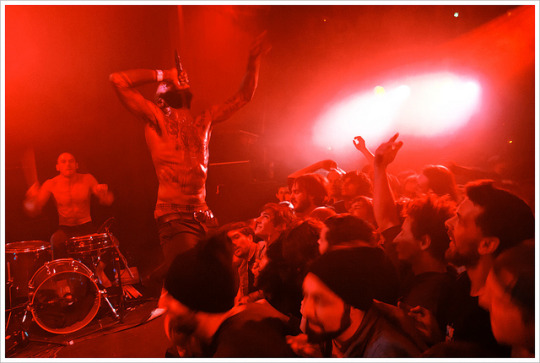
Image by Montecruz Foto via Flickr
Supposedly the album title has something to do with Charles Manson, at least according to their very vocal and sometimes uncomfortably affiliated online fanbase. It’s pretty rare that I can fully decipher what a song is about, other than generally surreal lyrics that hint toward a dirty and unsettling underground, whether urban, suburban, or solely online. Death Grips, if you don’t know, make experimental and abstract hip-hop, featuring dark and somewhat unconventional beats, with a live drummer, seeming to draw as much from the tradition of noise music than from rap. For as weird as all this is, however, there’s usually a pretty solid song structure underlying each track, and they create some sticky hooks out of all the electronic chaos and bellowed raps. This time around there seems to be a bit of a shoegaze influence as well, which…. doesn’t quite fit their aesthetic? But is pretty interesting all the same.
15) RAVYN LENAE - CRUSH
Steve Lacy from the Internet (the band) produced this 5 track long EP of retro/future funk and R+B. “Sticky” is as catch a song as ever there was, and Ravyn Lenae does a great job kind of floating over the beat, mixing up her delivery. These artists nod a lot to 70s R+B and funk, and I love that they preserve the strangeness of a lot of that stuff, that otherwordly vibe, whether it’s the “oooo-HOO-hoo-hoo” on “Sticky” or the blunted synth stabs on “4 Leaf Clover.”
16) HINDS - I DON’T RUN
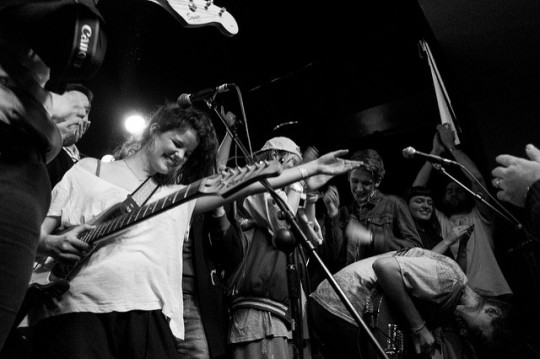
Image by Paul Hudson via Flickr
Indie rock from Madrid with several lady vocalists that’s just a tad sloppy, in a good way. Catchy and relationship oriented, but scratching at something deeper beyond the surface. I love the way the vocal mics all seem to distort slightly. Maybe I’m just an old now, but it makes me nostalgic for college in some way, smoking cigarettes and being heartbroken. Which was probably not actually as fun as I remember it.
17) JPEGMAFIA - VETERAN
Hard as hell raps over jittery noise beats that sometimes merge into moments of dreamlike beauty from a hip-hop auteur who handles all the production himself. This kind of reminds me of when Pitchfork called Odd Future “/b/ boys” (referring to 4chan). This is the new Extremely Online hip-hop, endlessly irony poisoned, vaguely left-wing but mostly cynical, inside jokes upon inside jokes. It seems like there’s some real anger in here too, and his raps often involve promises of violence, usually upon various members of the alt right: “Look, it’s the young alt-right menace; What’s the pistol to a pennant?”
18) MILO - BUDDING ORNITHOLOGISTS ARE WEARY OF TIRED ANALOGIES
Milo reminds me of the best of the older backpacker rappers, dropping classic lines so fast that you miss about 2/3rds of them the first couple times through. Equally at home dropping a reference to a video game, a philosopher, the harshness of race in America, and the Guggenheim fellowship, like one of those memes that eradicates the distinction between high and low culture by putting references to existentialist philosophers over a picture of Spongebob. Of course, hip-hop has always been doing that, hasn’t it?
19) EARL SWEATSHIRT - SOME RAP SONGS
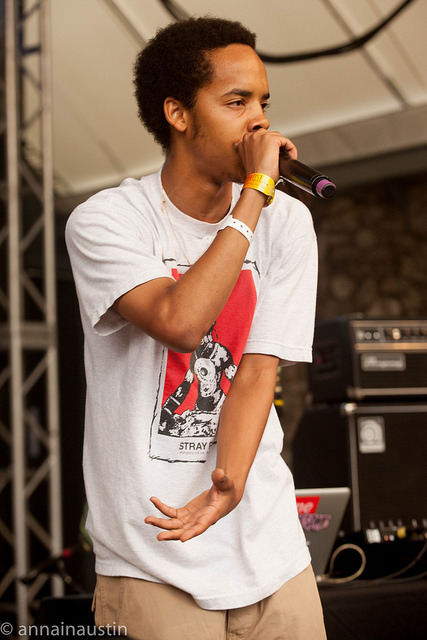
Image by Anna Hanks via Flickr
Another notably short album, at a brisk 24:39. The songs are short too, often coming across as sketches, though really this is the kind of project made to listen to in one sitting. Like a lot of the rap albums on here, this is a project that takes the beats as well as the rhymes seriously, pushing forward into avant garde territory, but in a mellower way than JPEGMAFIA or Death Grips. They have an almost hypnotic quality to them, as Earl raps in his slightly aloof manner, though here the aloofness feels more like a mask only thinly hiding a deep sense of melancholy. The samples on here are thick with that old record hiss - even the vocals are hissy, like a transmission from someplace far away.
20) SUDAN ARCHIVES - SINK
Sudan Archives is a violinist from Cincinnati who makes pop music that sounds like nothing else out there, though it takes cues from hip-hop, R+B, electronica, and world music. The beats are stripped down but still lush sounding, the violin often leading in a way that sounds strange and otherwordly, utilized for it’s ability to create rhythmic hooks, while her lyrics meld the personal with the empowering with the political.
21) TEYANA TAYLOR - K.T.S.E.
Kanye West produced 5 different 7 to 8 track albums this year, with mixed results. A lot of people stan Pusha T’s Daytona, but this one was my favorite, a short and sweet album that’s mellow, romantic, and a little dirty. Teyana Taylor puts in a very versatile performance, and her voice is perfectly suited to ride over the old soul samples that make up the bulk of the production. Kanye’s musical output was of course overshadowed by his various bizarre political statements and right wing flirtations, but it would be a shame for this gem to get lost in the fray.
22) CHURCH OF THE COSMIC SKULL - SCIENCE FICTION
I don’t always love heavily conceptualized “revival” type bands, but this one is so much fun, not just doing pitch perfect 70s hard rock, but also spoofing (at least, I think it’s a spoof) the phenomenon of 70s cults. The members seem to dress in all white, and look like they just stepped off some Jesus-dude’s farm/compound. Of course it wouldn’t work if the music wasn’t so damn hooky. Harmonies, heavy organs, and hella riffs.
23) VINCE STAPLES - FM!
And another super short hip-hop album from one of contemporary rap’s best. Vince’s projects usually feature stripped down beats that would sound good in a car or a club, but the lyrical matter is dark as hell, another example of what a strange genre gangsta rap is when viewed from the outside. It’s hyper-masculine and braggadocios, but also equally often an expression of black pain that is then commodified into bangers for clubs, cars, and house parties full of white frat boys to dance and drink to. The contrast is all the more apparent every time Vince mentions one of his dead friends. I dunno dude, maybe I’m just getting old.
24) JANELLE MONAE - DIRTY COMPUTER
This didn’t grab me as immediately as her previous two full lengths, trending a little too close to mainstream pop for my tastes. But underneath the added sheen, it’s still a Janelle Monae album, bouncing gleefully from Prince-style funk jams to buoyant electro tunes. Monae drops the cyber-punk robo future concept to make an on-the-nose, album length celebration of queerness (though I think there may be some sci-fi on the Dirty Computer short film, which I haven’t watched yet.) The celebratory nature fits the larger, more conventional pop moves here, a sort of “queering” of mainstream pop. There’s also more rapping here than ever, and it’s always fun to hear Monae drop some bars.
25) FUCKED UP - DOSE YOUR DREAMS
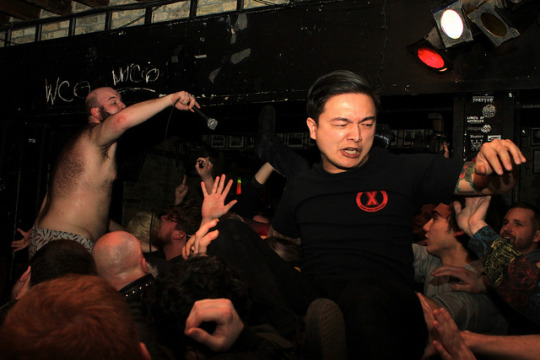
Image by CRUSTINA! via Flickr
Similar to the above, this is an album from a long time favorite of mine that didn’t grab me as much as their earlier efforts, and that also seems to be making some moves toward a more mainstream pop sound, though here of course it’s pop music featuring a bellowing, gravel voiced hardcore singer and a bunch of loud Cock Sparrer style guitar lines. This is a concept album, apparently about a character who quits his job and goes on a drug fueled odyssey through the nature of reality, learning to reject an oppressive capitalist society, which sounds like the plot of an 80s British comic book, and hey, the cover is basically ripped straight from the pages of Watchmen, so there you go. They try out a lot of different styles here, which can be a bit hit or miss, but the core of Fucked Up, the interplay between Abraham’s bombastic bellows and huge sounding guitars, is as raucous and triumphant as ever, if a little more familiar.
1 note
·
View note
Text
Still in Edmonton
So it’s Spring in Edmonton. The weather is warmer, the snow is melting, and everything looks ugly. You know, the melt is dislodging the garbage and gravel that was embedded into the snow, creating a muddy mess, and where it isn’t a muddy mess, everything is simply brown and dry. The grass truly is not greener here until May. Still, there’s something about this season that makes it synonymous with change, and with change comes reflection.
I had to do this assignment in one of my classes this semester on “material culture.” Basically, I needed to figure out a material aspect that represented my culture and then present. I was gonna be cliche and just pick my camera or something along those lines, but I decided to be innovative and pick something that literally both represents me and my background. So I went with the perogy, an Eastern European dumpling.
The reason I chose it was two-fold: it represents my ethnic background on one side and it also represents my home. The Parkland region of the Canadian Prairies, roughly corresponding with the Yellowhead corridor, from Edmonton to Winnipeg, is home to a huge Ukrainian diaspora. When the Canadian West opened up in the late 19th century, Ukrainians were among the earliest settlers to the untamed flatlands, and were pivotal in converting the land into arable farmland. They were chosen due to the similar climate of Eastern Europe and the Canadian Prairies. Most Ukrainian immigrants stayed in rural areas, like the Edna-Star Colony, and did not migrate into the cities until after World War II. As a result of this diaspora, Edmonton has the nickname “Edmonchuk” (-chuk is a common suffix to Ukrainian last names) and as the diaspora integrated and mingled with wider Canadian society, certain aspects of Ukrainian culture were annexed into the wider culture here. This was largely in the form of food, especially perogies, which is a popular dish here, regardless of ethnic background. But even things like pysanka and the presence of Ukrainian Orthodox churches on the landscapes show the influence of Slavic culture in the Parkland. So, in choosing perogies as my “material culture,” I wasn’t speaking merely about my heritage, I was also speaking directly to the place I inhabit and its own culture. Someone born in Edmonton, but of an Belgian or Bengal or Brazilian background could’ve chosen perogies too and it would’ve been accurate.
I actually thought, knowing the strong Ukrainian slant here, that maybe someone else in my class was also going to use perogies as their “material culture” example. But no one else did. The whole perogy thing kind of reaffirmed how embedded in this place I am, to an extent that few people seem to be. Maybe that’s arrogant. I mean, there are other tokens of Parkland culture out there, and Ukrainians weren’t even the only people settling the West in the 1890s and 1900s. Hell, the other half of my family didn’t even arrive in Canada until after World War II! To be fair, with regards to the “material culture” assignment, there were other people in my class that could’ve been just as embedded into the psyche of this place, but their examples were more broad. Like coffee was a common example of “material culture” that a few people used, but that’s more of a wider Western thing, and someone doing the same assignment in Toulouse or Tuscaloosa could’ve said the same thing.
When I look at the people around me, I often find it hard to come across people who are as embedded in Edmonton and Alberta psychologically as I am. I really feel like I am of Edmonton, for better or worse. A lot of people, especially since the mid-2000s boom, are relatively recent to Edmonton. People from across Canada have been coming in droves for the “Alberta Advantage” and cities like Edmonton have ramped up the intake of foreign immigrants. It feels like everyone here is more tied to somewhere else. In a lot of ways, this demographic change-up is great. Objectively, Edmonton is a far more progressive, vibrant, diverse, and all around simply a better place than it was in 2003.
At the same time, though, it’s kind of alienating being surrounded by people who are out to make a quick buck off of oil, and funnel money back east or overseas, without a care for what this place actually is. There’s a transiency to Alberta, which is felt most acutely during boomtimes. It happened in the ‘80s, it happened in the mid-’00s, and again in the early ‘10s. It’s tapered off somewhat over the past few years as oil prices dropped, but there is still a large amount of people here who aren’t really connected to this place the way that multi-generational Edmontonians are. To be totally fair, I know people who’ve come here from near and far and absolutely love Edmonton and are interested in knowing what it’s about, but they seem less common. I’m probably complaining about nothing; like I said Edmonton is objectively better off now and I objectively like the way things are improving.
But feelings are never objective. It’s weird how you can be nostalgic about eras that, when you look back critically, you can be like, “yeah, no, I’ve definitely got it better now.” I feel that way with Edmonton a lot of times. The sleepy, parochial, depressed Bill Smith-era city I grew up in was unequivocally a shitty one, riddled with a small town mentality that made anyone remotely progressive cringe. And yet, I somehow miss it occasionally. For years, I lamented how dead downtown was, and now that the stunning new arena is built, with spillover development well underway, I can’t help but think just how much of a scene downtown is now. It’s, like, too popular now, or something. I’ve been thinking of going to spots that remind me of the Edmonton of yore and photographing them. I sorta already did one photo like that, here.
Yet on the flip side, I am routinely forced to contend with just how far behind Edmonton feels in terms of urban planning compared to every other major Canadian city, even smaller ones like Winnipeg, Quebec City, and Halifax. I’m confronted with signs on Jasper Ave that, as a pedestrian, tell me to cross the street on the other side of the road. Like, what the hell. It’s Jasper Ave, not Saddleback Road. Even when there’s progress, it’s half-assed. New LRT? Great! Forgetting we dodged a bullet with underground LRT downtown and deciding to build above ground a la Calgary? Dumb! Deciding West Jasper Ave needs to stop being a stroad? Fabulous! Forgetting to bother with benches and trash cans and the like? Fail! Committing to more cycling infra but cheaping out with sharrows? Why bother? You’d think being the liberal bubble of the province, Edmonton would be open to more sustainable forms of planning. Realistically, I think a large part of the issue stems from just how far Edmonton fell behind by circa 2006, after being stagnant for a generation, and so there’s still much catch up to do.
Basically, I am nostalgic about the stagnant Edmonton of yesteryear while still complaining about lack of progress. Makes sense, right? I want more people from a myriad of places to come here and expose this place to new ideas but dislike that they will never know the Bill Smith Edmonton I grew up with. I’m basically an old man barking at the clouds and can’t be satisfied.
At least not here. I feel stuck here. I know Edmonton’s really not a bad place and there’s a lot of momentum here, but I’m just so disengaged with the place that the only thing holding me here is the people. Perhaps that’s part of the issue. I didn’t move around much in childhood, which further cements me in this Parkland metropolis. While many of my friends have family scattered around the country, from where their families first settled in Canada (or the US), almost all of my family is here, in Central Alberta. Both sides of the family came straight here from Europe. So I don’t have some distant aunt in Montreal or a cousin in Moncton, which, again, entrenches me in this place. Also, unlike first-gen friends of mine, who have some ties back to the old country, I don’t really have connections across the Atlantic. What ties there were pretty much evaporated with the passing of my grandfather. Thus, I am very much “Canadian” (not to say first-gens can’t also be unequivocally Canadian, but that I have no alternative), but also very Albertan and Edmontonian. At least in some ways. I suppose I’m more of an Albertan-by-birth than an Albertan-by-choice; a lot of the values here don’t align with my own. I was thinking of this recently within the context of my Canada project, and maybe there’s something there about wider Canadian culture and values resonating with me in a way that Alberta doesn’t.
I probably just need to get out of here, even temporarily. Being in university distracts me a bit from the limitations of Edmonton as a place for me, but it only goes so far. It’s hard to leave, though. I’m very embedded in this place and most of my connections are here. It’s hard to give that up. Maybe I’ll move to Toronto or Halifax eventually, or maybe I’ll do that term abroad in Holland. I’m locked into Edmonton for another year, though. I’ve heard on multiple occasions that moving away from Edmonton, after having grown up here, presents an opportunity to really appreciate Edmonton and it makes for a more enjoyable place upon returning. Or I could just be like “bye bitch.” Or maybe I’ll stay put, settle down, and come to terms with being of Edmonton. But it hasn’t happened in the many years I’ve felt this longing to leave, so I’m skeptical.
There’s also this other thing with Edmonton that is kind of special. Because of how stagnant things were here through the ‘90s and into the 2000s, Edmonton did fall behind, as previously mentioned. But from that, there is a lot of potential here to inflict change. It’s in part the whole big fish in a small pond thing, but it also has to do with how much of the city feels like a blank canvas, and through those things, how much easier it is to have a positive impact on Edmonton’s future in a way you can’t in Toronto. Edmonton is far less established as a place, so being here, especially now, not only can you put in the tokens that will churn out progress, you can also watch it happen before your eyes. I’ve witnessed a lot of progressive change happen to Edmonton in my lifetime and it really makes you feel apart of the process and makes you appreciate all that has gone in to make Edmonton better. You wouldn’t get that if you fucked off to Montreal or even Vancouver. Still, the progress, although palpable, does take time. It took 6 or 7 years before the City finally started upgrading the streetscape of the Quarters after the initial Area Structure Plan came out in ‘08 or ‘09. Essentially, I don’t want to be 70 before Edmonton gets to the point where it’s the kind of place I am happy with. Some days, I just wanna go somewhere where that stuff is already in place. Sure, it’s the easy route (in a way), but it makes sense in a way to not waste your life hoping your hometown will finally change to fit your definition of better.
All I know is that I’m still here. For now. Actually those t-shirts are really resonating with me right now and I should probably get one. They sum up my mood with this oil-drunk Parkland metropolis I call home. So how’s that for Springtime reflection?
2 notes
·
View notes
Photo

The Most Treasured and Iconic Christmas Toys
Christmas toy fads have been a big part of the holiday season for the last few decades. Certain toys instantly remind teens and adults of their early childhoods during the magic of the holiday season, making them excellent finds for sentimental gifts. Refresh your memory on the following iconic Christmas toys and get your shopping strategy on point to bring home a few sentimental gifts for your loved ones.
Christmas Toy Trends Through the Decades
1960s

In the 1960s, kids were trying their hand at making bite-sized baked goods in Easy Bake Ovens and battling with Rock-em Sock’em Robots. Other iconic toys like G.I. Joe and Etch A Sketch also made a splash. G.I. Joe is especially notable as the first action figure, and originally came in Action Soldier, Pilot, Marine and Sailor.
1970s

A notable Christmas toy trend of the 1970s is the Pet Rock from 1975 ― a gag gift that took off thanks to its clever packaging, which resembled a small-animal carrier with breathing holes. By the late 70s, Star Wars action figures and other toys from the franchise, like metal lunch boxes, masks, clothes, and bedding, were hot items for Christmas, particularly in 1977, after the release of A New Hope.
1980s

Cabbage Patch dolls and Transformers action figures dominated the holiday toy scene in 1983 and 84, showcasing the fact that technology hadn't yet become a major part of toy design. But by the end of the 1980s, the Nintendo Entertainment System and Game Boy portable video game console had become the dominant toys of the holiday gifting season, and not just for kids. Though other consoles were available, Nintendo dominated the U.S. market during the holidays.
1990s

Technology-focused toys were a major part of the 90s, with the Talkboy, a handheld recording device, that created mass sellouts and caused the manufacturer, Hasbro, to pull ads from TV in 1993 due to the lack of available inventory. Beanie Babies also hit the scene in 1995, with kids amassing large collections of these cuddly toys in the hopes of someday cashing in on a perceived investment. 1996 introduced the Tickle Me Elmo, a toy that remains one of the most noteworthy gift fads of all time due to the high prices commanded by scalpers on the pre-Christmas resale market.
2000s

Pokémon toys and trading cards held over as a top Christmas toy from 1999, but in the early 2000s Razor scooters and Bratz dolls reigned king of holiday toy sales. Sales for Razor scooter topped over one million scooters sold during the Christmas season, making America’s youth more mobile than ever.
Consider the Purpose Before You Purchase

No matter which iconic holiday toy you choose to gift, take some time before shopping to consider how the gift recipient will use the item. Highly collectible toys may sell for more when presented in "mint in box" condition, as these tend to be the most highly covetable items for serious collectors. When you plan to give the toy to a child who will actually play with it rather than simply display it on a shelf, you might not want to pay mint-in-box prices. An unboxed toy in good condition can be perfectly suitable for a kid who just wants to be able to play and have fun with their holiday present. When you're buying the toy for an adult as a sentimental reminder of their past interests and happy Christmases of their childhood, quality isn't as important as the accuracy of the item itself. Try to find out the exact model or version of a toy that person had so you can look for just the right match for their memories.
How to Find and Iconic Toys from the Past

Online marketplaces like EBTH are a great place to dig for surprising finds, with iconic toys like the Pet Rock or Tickle Me Elmo. You can search for specific toys using keywords or browse the Toys & Games category for great vintage finds. Detailed descriptions include specific identifiers like the year and make of a toy, as well as condition issues for more collectable-intended gifts. Detailed professional photographs will help you confirm which stuffed animal is cuddly enough, or which action figure has the most pristine packaging. Don't wait until December to shop the unique EVERYTHING BUT THE HOUSE auctions for iconic Christmas toys to delight your loved ones.
#EBTH#Features#Everything But The House#Christmas#holidays#toys#pokemon#beanie babies#game boy#star wars#GI Joe#Easy Bake Oven#rock em sock em robots
0 notes